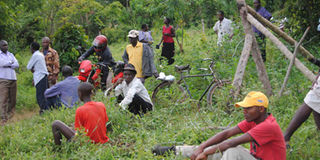British firm illegally evicts 20,000 Ugandans

The revelation is contained in a report, Land and Power, released on Thursday by British NGO Oxfam, which notes that speculators, pension funds and global agri-businesses from rich countries have been quietly acquiring large chunks of land in developing countries such as Uganda, South Sudan and Indonesia, leading to conflict, hunger and human rights abuses.
Oxfam reported that many evictees told of how they were forcibly removed and have been left destitute, without enough food or money to send their children to school.
In a press statement, Oxfam International’s executive director Jerry Hobbs said the Uganda case “clearly shows how land grabs are slipping through the net of existing safeguards which are intended to ensure the protection of vulnerable people.”
However, the British timber company denies any involvement in the evictions.
In an email to this newspaper yesterday, the company’s head of corporate responsibility, Kate Sharum, wrote that New Forests Company (NFC) “takes Oxfam’s allegations extremely seriously and will conduct an immediate and thorough investigation of them. Our understanding of these resettlements is that they were legal, voluntary and peaceful and our first hand observations of them confirmed this.”
New pressure on land: communities at risk
Christine (not her real name) and her husband used to grow enough food to feed their eight children on the six hectares of land that they had farmed for over 20 years. By selling the surplus at the market, they could afford to send their children to school. Instead of living in their old six-room home, complete with kitchen, they now struggle to pay rent for a cramped two-room house, where there is not enough land to farm and grow food. Christine’s children often eat only once a day and are no longer receiving an education, as it is too expensive. She and her husband were once self-sufficient, but now depend on the goodwill of friends and neighbours and whatever casual labour can be found.
Christine is among more than 20,000 people who alleged that they have been evicted from their homes and land in Kiboga District, and nearby Mubende District, to make way for UK-based NFC plantations.
The Ugandan National Forestry Authority (NFA) granted licences over the plantation areas to NFC in 2005 and authorised the eviction of local residents, which took place by February 2010 in Mubende and July 2010 in Kiboga. The NFA says that the people living there were illegal encroachers on forest land and that their evictions were justified.
NFC presents itself as a “sustainable and socially responsible forestry company”. It has applied for carbon credits for carbon offsetting, and says it creates jobs in rural areas and builds schools and health facilities as part of its community development programme.
NFC maintains that, in Mubende and Kiboga, locals left the land voluntarily and that, in any event, it would bear no responsibility for evictions from land licensed to it. The company said that it did not evict and it “has very limited rights and certainly no rights to evict anyone”.
But in the Thursday report, Oxfam said that NFC’s operations highlight how the current system of international standards – designed to ensure that people are not adversely affected as a result of large-scale transfers of land use rights – does not work.
“The serious impacts of the operations on local villagers, raise particular concerns given that NFC operations are supported by international investment from institutions including the World Bank’s private sector lending arm, the International Finance Corporation (IFC), as well as the European Investment Bank (EIB) and HSBC, all of which claim to uphold high social and environmental standards.”
Oxfarm in its report blames the company for following the NFA in describing the displaced groups, some of whom claim to have spent their entire lives on the land, as ‘illegal encroachers’ and ‘trespassers’.
According to NFA, “the majority of people who had settled within the land had done so illegally”, with the exception of 31 families that could demonstrate such ownership.
NFA says that “no families in Kiboga have demonstrated rights to the land they used to occupy.”
The 20,000 villagers, however, believe that they have clear legal rights to the land they occupied, and both communities took the case to the High Court to protect those rights. These claims were resisted by NFC and NFA, and it ignored the High Court order and evicted them from the land.
Residents from Kiboga state that they were invited to move onto the land in the 1970s by the Idi Amin regime. They also say that the government recognised their rights to stay on the land, allowing them to build schools and establishing administrative structures.
Many of the people who lived in the Mubende concession area say they were allocated land in the area as Second World War veterans, who fought in Egypt or Burma for the British, or their descendants. Others say they bought, were gifted or inherited land during the 1980s and 1990s.
The residents told Oxfam that the army and police were deployed in the area to enforce the evictions, and that many people were beaten during the process. Some villagers also say that casual labourers, whom they believe were employed by NFC, joined the police and army in burning homes, destroying crops and butchering livestock.
The residents who took the company to the High Court allege that NFC trespassed on their land, destroyed homes, crops and animals during the eviction.
NFC, however, denies involvement in any evictions or violence and says “there were no incidences of injury, physical violence or destruction of property during the voluntary vacation processes that have been brought to the attention of NFC”.
What the surveillance audit found out
In support of this position, NFC points to a surveillance audit for the Forest Stewardship Council (FSC), which notes “there were no incidences of injury to the encroachers or forceful eviction reported during the clearance process in Mubende”.
NFC denies breaching any court orders because “NFC was not responsible for any evictions and says that evictions from forest reserves are solely in the hands of the government and its designated authorities.”
The residents, however, claim in the report that none of them, and no one they know, who had lost their homes and livelihoods, had received compensation or alternative land to date. Some say that local authorities offered compensation, but this has come to nothing.
Documents, however, show that Kiboga residents were offered alternative land which they rejected because it provided insufficient space and was merely a temporary solution.
NFC accepts that the failure to provide compensation “is of great concern to NFC for both risk mitigation and ethical reasons”. The company said in the report that it offered to be part of the compensation process but was prohibited from doing so by the NFA.
“However, as licensees, we are expressly prohibited from offering anyone on government land any compensation.”
Oxfam, however, states in its report that the legalistic approach taken by NFC in response to the court orders and on the issue of compensation is inappropriate for an ethical corporation, especially given the international standards to which the company says it adheres.
British company NFC writes back
“The New Forests Company takes Oxfam’s allegations extremely seriously and will conduct an immediate and thorough investigation of them. Our understanding of these resettlements is that they were legal, voluntary and peaceful and our first hand observations of them confirmed this.
This has been corroborated on a number of occasions by meticulous audits of the company by highly respected international organisations including the FSC (Forest Stewardship Council) and the IFC (International Finance Corporation, part of World Bank). The FSC concluded that “Officials consider Namwasa one of their most peaceful and successful experiences in encouraging illegal encroachers to voluntarily leave Central Forestry Reserves and would like to use the model for controversial areas in the future”.
NFC is puzzled by the extent to which Oxfam’s anecdotal evidence is so at odds with these findings.
NFC also regrets Oxfam’s decision to publish this highly prejudicial report without having given NFC the opportunity to investigate its claims.
In attacking the NFC Oxfam have chosen a company with an impeccable track record in community investment and development who in their short life have not only created over 2,000 jobs in remote rural Ugandan communities but been responsible for increasing access to health, education, clean water and fuel. Africa needs responsible inward investment.’’




